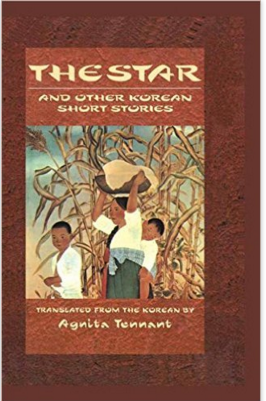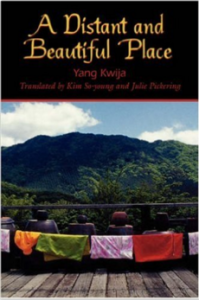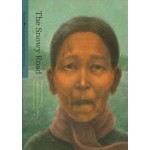 The Star & Other Korean Short Stories (Unesco Collection of Representative Works), translated by Agnita Tennant is available on Kindle for rent at $16.05 and for purchase at $38.36, which is a bit pricey, but can be had in hardback for as low as $4.69 used (Use this link to find it, as the Amazon search engine seems resistant to other terms). Often times a UNESCO affiliation with a book of short stories from this era is kind of kiss of death, as UNESCO, was a ruthless ‘gatekeeper’ at the time and thus often chose absolutely incomprehensible works to translate (As in the Modern Korean Short Stories collection of 10 books, which include some real yawners and stories that meander pointlessly before sniffling out). But this collection is better than that and some of the credit must certainly go to translator Agnita Tennant and whoever chose the stories. The book contains eight stories, two of which are available elsewhere; The Snowy Road by Yi Chong-jun and The Poet of Wonmi-dong, by Yang Gui-ja which I might consider purchasing separately, as the first is only one chapter of A Distant and Beautiful Place and the former is also available in an elegant little edition put out by Hollym Press. All the stories are excellent “representative” tales of Korean history and outlook as well as being excellent stories in their own rights.
The Star & Other Korean Short Stories (Unesco Collection of Representative Works), translated by Agnita Tennant is available on Kindle for rent at $16.05 and for purchase at $38.36, which is a bit pricey, but can be had in hardback for as low as $4.69 used (Use this link to find it, as the Amazon search engine seems resistant to other terms). Often times a UNESCO affiliation with a book of short stories from this era is kind of kiss of death, as UNESCO, was a ruthless ‘gatekeeper’ at the time and thus often chose absolutely incomprehensible works to translate (As in the Modern Korean Short Stories collection of 10 books, which include some real yawners and stories that meander pointlessly before sniffling out). But this collection is better than that and some of the credit must certainly go to translator Agnita Tennant and whoever chose the stories. The book contains eight stories, two of which are available elsewhere; The Snowy Road by Yi Chong-jun and The Poet of Wonmi-dong, by Yang Gui-ja which I might consider purchasing separately, as the first is only one chapter of A Distant and Beautiful Place and the former is also available in an elegant little edition put out by Hollym Press. All the stories are excellent “representative” tales of Korean history and outlook as well as being excellent stories in their own rights.
The title story, The Star by Yoo Jai-yong tells the tale of a “bicycle pusher” who twice in one day is affected by the retreat of North Korean soldiers. There is a solid middle section explaining a bit about the political situation villages found themselves in, both in quotidian and tragic ways. The story builds to a tense ending, but then in classic Korean style more or less, just lets the tension go, and ends abruptly.
My Father’s Land by Im Chol-woo is a much more satisfying story of two narrators whose lives are tied together by a corpse in an unmarked grave. One main character is an army private who, digging a defensive position, uncovers a grave, and the other is a young boy living with his mother. To say more would be spoilerish, but this is a well told story, with lively characters and an ending that ties things together in an unusually satisfying (in plot terms) way.
A Thin Line, by Yeo Keumho is a scattered, over time and space, story putatively about a fishing trip of a salaryman beginning to age, and a coming to terms with his history. It has some interesting conversations about shamanism, and, obviously, the “thin line” has reference to more than just fishing line.
The Guest (not the longer novel by Hwang Suk-yong) is another separation story, in this case a middle-aged city man is on a mission that he picked up in the United States to leave money with wife left behind (by another man). Whenever he can, he travels Korea, going to remote monasteries, because this is all he knows about her situation. Unbeknownst to the man and the mystery woman, the do in fact meet, and.. .well, the end is open to interpretation…. The man does realize he has found the woman, but no wanting to have an uncomfortable face-to-face discussion with her, leaves the money with Master of the monastery.
i\She Knows, I Know, and God Knows but… is an awesome story that really expresses the sparkling and funny writing style of Korean authorial legend Park Wan-suh (The only other translation that I feel gets this completely right is the Dalkey Archive Press collection of Park’s work, Lonesome You). It tells the tale of Songnam-dek an independent and saucy woman, who has been a tireless companion to a slowly dying man, and how in the end the surviving family cheats her out of her due. And yet, the story, while it involves the fleecing and a large amount of class-based snobbery, ends on a note of grace, with Songnam-dek having achieved some of what she wants, and walking off into the sunset on something like her own terms.
Why the Silkworm Does Not Leave the Cocoon by Yoon Chongmo, begins with a bit of a rant and rancor, but soon turns into another story of a separation of a different kind. A dying elderly woman tasks her younger neighbor to track down a woman in a different village and return with that woman. The neighbor finds the woman, and in her time, she returns to the site of her mother’s death. Yoon nicely uses the separation, and the symbol of the cocoon to describe how our lives, up until we are finally bound by death, tie us together, one strand at a time.
 The Poet of Wonmi-Dong is story of cowardice and betrayal, told by a young narrator who would be insufferable (think of the solipsistically self-aware and ironic young narrator in the movie Juno) were she not so funny and perceptive. The local poet, caught up in a random semi-political, semi-thug beating, is betrayed by his boss, who then displays a remarkable level of hypocrisy in the aftermath. The ending, reveals the cost of this act. The Poet can also be found in the larger yosok sosol A Distant and Beautiful Place, which is in itself worth purchasing.
The Poet of Wonmi-Dong is story of cowardice and betrayal, told by a young narrator who would be insufferable (think of the solipsistically self-aware and ironic young narrator in the movie Juno) were she not so funny and perceptive. The local poet, caught up in a random semi-political, semi-thug beating, is betrayed by his boss, who then displays a remarkable level of hypocrisy in the aftermath. The ending, reveals the cost of this act. The Poet can also be found in the larger yosok sosol A Distant and Beautiful Place, which is in itself worth purchasing.
Snowy Road is another story of separation, although a different kind. A generational weeper, it features a spectacularly un-sentimental son and his wife visiting the son’s mother. The story takes place in real-time and flashback, revealing to some extent why the son is the way he is, but also with open sentimentality revealing the love of the mother,  and the sacrifices she made to ensure her son’s success. There is an amusing sub-plot in which the grandmother indirectly hints that she would like the son’s help in participating in a village-wide effort to upgrade housing (she has one of the last two non-upgraded houses, and the village is somewhat affronted), and the son’s wife seems sympathetic. The story ends before the son leaves, and a reader can only hope that he, too, was affected by his mother’s story.
and the sacrifices she made to ensure her son’s success. There is an amusing sub-plot in which the grandmother indirectly hints that she would like the son’s help in participating in a village-wide effort to upgrade housing (she has one of the last two non-upgraded houses, and the village is somewhat affronted), and the son’s wife seems sympathetic. The story ends before the son leaves, and a reader can only hope that he, too, was affected by his mother’s story.
All in all, a great set of stories and a fine way to begin understanding Korean literature and such concepts as han and jeong. Printed by UNESCO some decade after their first attempts to translate Korean fiction, I am happy to say that UNESCO seems to have learned quite a great deal, and this book is more than just a historical relic.
Worth picking up in your next order from Amazon, particularly if you can bundle it in shipping.


